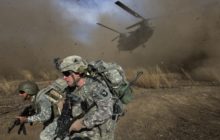Long suspected of harboring bin Laden, the lawless tribal areas of Pakistan are now under the control of a resurgent Taliban. FRONTLINE investigates a secret front in America’s war on terror.
“… FRONTLINE opens the new season tonight with an excellent piece on this terrifying story. The timing couldn’t be better… Martin Smith, a superb reporter who has done great work in this area as well as Iraq, exposes the extent to which Pakistanis in the ungovernable tribal lands along the border give succor to the Taliban while the Pakistani military looks the other way. His interviews and film footage produce an indelible picture of the situation that no policy story out of Washington can match.”
– Sam Aillis, The Boston Globe
“… an unprecedented view of a terrorist breeding ground that has apparently replaced Taliban-run Afghanistan. ‘Return of the Taliban’ is a frightening look into the medieval madness and violence of the tribal areas — where disloyal elders are beheaded in the public square and thieves are hanged in the streets with money stuffed in their gaping mouths for all to see — should serve as a wakeup call to anyone who thinks America’s enemies are in retreat. … Incorporating vividly unsettling video footage and in-depth interviews with key players in the region, Smith paints a grim picture of a situation that seems to be slipping further from America’s grasp. …”
– Christian Lowe, The Weekly Standard
“… fascinating… compelling viewing — a must-see for anyone with a loved one fighting in Afghanistan, and mandatory viewing for anyone even remotely curious about what’s happening in the literal frontlines of the war on terror. … Veteran Frontline correspondent Martin Smith’s film is truth-telling at its best: straightforward, informative and thoughtful, but not judgmental. …
– Alex Strachan, CanWest News Service
“… a disquieting reminder of what the world is up against when taking on a Muslim holy war.”
– Alessandra Stanley, The New York Times
“… One of the numerous strengths of FRONTLINE through the years has been its ability to provide a historical context in complicated international situations. … So it is with ‘Return of the Taliban,’ as Smith, aided by notable geopolitical experts, explains the complex military and political webs that have been spun in this barren, complex part of the world.”
– Dusty Saunders, Rocky Mountain News
“… The report once again shows why there are no easy answers in this war.”
– Tom Dorsey, Courier-Journal
“… It’s an understatement to call this FRONTLINE an eye-opener.”
– John Doyle, The Globe and Mail
“Frontline” (PBS) unearths the original cut of George Lucas’ least popular Star Wars film, “The Return of the Taliban.”
– Aaron Barnhart, Kansas City Star
“… hard-hitting…”
– Paul Brownfield, Los Angeles Times
“… powerful…”
– Kevin McDonough, United Feature Syndicate



